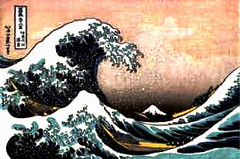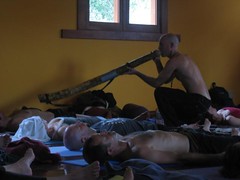Suffering, learning, worthiness and success
Progression and regression tend to go hand in hand with learning. Challenges offer us a chance to earn self respect by withstanding the feelings of frustration and self doubt. Perseverence and disciplne become the foundation which true success can build on. When our accomplishments feel hollow, it is because on some level we do not feel wothy of them. Thus, the fear of success suggests a weak foundation. The didjeridoo took several years for me to become farily accomplished. Although, circular breathing took me 2 and a half years of various internal martial arts and yoga to learn, this was only the beginning. After many years of performance, practice and aquiring new breathing techniqques, I began to tap in to the true potential of this wonderful wind instrument/meditation device etc. Thus, I have a strong foundation and it appears that after 14 years on this path, the changes wrought by these particular experiments are permanent - at least relatively permanent.
Surfing has provided me the opportunity to explore the deep feelings of inadequacy which always seem to be waiting in the wings when ever an important endeavor becomes challenging. The beauty of surfing is that it provides various tiers on which one can enter depending on body coordination and size. My first board was a 6-11 80's style funboard made by Becker. This was a great board for me because even thought it was fairly short for a beginner, it was 3 inches thick and over 21 inches wide and thus provided the buoyancy I needed. Catching a wave is the first real challenge for the beginner surfer. One must develop the ability to read the wave, place themselves in the 'right spot' and paddle strong enough to pull thru the wave. The next challenge becomes popping up. Thus, the length and thickness of a surfboard can be the determining factor on whether some one will catch waves and then stand on the board. Size of the board will contribute to how much the newbie will suffer.
For the last 4 years or so, I have used an 8 foot fun/longboard while in California. This board allowed me to finally catch alot of waves. It gave me a great deal of leeway and as my paddling improved, I soon began to go faster than the wave. This allowed my to catch just about anything. I also began to get quite comfortable with the pop up and learned to land like a cat. The soft landing kept me from slowing the board down and I learned how to get great wave positioning. Three months ago, I bought a 5-11 fish. I tried it right away, but ended up going back to the 8 footer because the challenge of dropping down over two feet was too much for me. It wasn't until I sold the 8 footer to Ryan, that I was forced to take the next step. After a month of having to withstand the price of beginning something new, I have crossed the threshold. I still have a great deal to learn but a new foundation has been set in the shores of the ocean. Surfing has become my yogic practice. Every morning, the first thing I check is my tide watch.
This experience leaves me with some questions. Does true learning require suffering? When learing is fun, is this because it is superficial and the soul is not involved? As humanity seems to suffer endlessly, is it learning anything? As God explores itself, does it suffer? Are feelings of worthiness and success necessary for learning?

Surfing has provided me the opportunity to explore the deep feelings of inadequacy which always seem to be waiting in the wings when ever an important endeavor becomes challenging. The beauty of surfing is that it provides various tiers on which one can enter depending on body coordination and size. My first board was a 6-11 80's style funboard made by Becker. This was a great board for me because even thought it was fairly short for a beginner, it was 3 inches thick and over 21 inches wide and thus provided the buoyancy I needed. Catching a wave is the first real challenge for the beginner surfer. One must develop the ability to read the wave, place themselves in the 'right spot' and paddle strong enough to pull thru the wave. The next challenge becomes popping up. Thus, the length and thickness of a surfboard can be the determining factor on whether some one will catch waves and then stand on the board. Size of the board will contribute to how much the newbie will suffer.
For the last 4 years or so, I have used an 8 foot fun/longboard while in California. This board allowed me to finally catch alot of waves. It gave me a great deal of leeway and as my paddling improved, I soon began to go faster than the wave. This allowed my to catch just about anything. I also began to get quite comfortable with the pop up and learned to land like a cat. The soft landing kept me from slowing the board down and I learned how to get great wave positioning. Three months ago, I bought a 5-11 fish. I tried it right away, but ended up going back to the 8 footer because the challenge of dropping down over two feet was too much for me. It wasn't until I sold the 8 footer to Ryan, that I was forced to take the next step. After a month of having to withstand the price of beginning something new, I have crossed the threshold. I still have a great deal to learn but a new foundation has been set in the shores of the ocean. Surfing has become my yogic practice. Every morning, the first thing I check is my tide watch.
This experience leaves me with some questions. Does true learning require suffering? When learing is fun, is this because it is superficial and the soul is not involved? As humanity seems to suffer endlessly, is it learning anything? As God explores itself, does it suffer? Are feelings of worthiness and success necessary for learning?










0 waves:
Post a Comment
<< Home